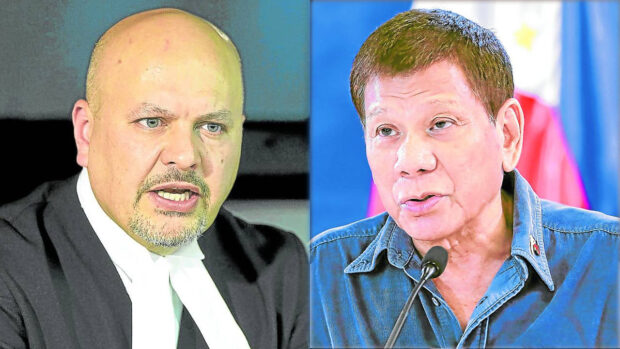
Karim Khan —REUTERS; Rodrigo Duterte —Malacañang file PHOTO
The appeals chamber of the International Criminal Court (ICC) will announce on July 18 its decision on whether the tribunal can resume its investigation of the crimes against humanity allegedly committed during the drug war launched by Rodrigo Duterte as president and Davao City mayor.
In a brief media advisory issued on July 12, the ICC said it would deliver, in open court, its judgment on the appeal of the Philippine government against the Pre-Trial Chamber’s authorization to resume the investigation of the prosecutor.
A green light from the appeals chamber will allow Prosecutor Karim Khan to formally proceed with his investigation of the drug war during Duterte’s presidency, as well as the extrajudicial killings carried out by the so-called Davao Death Squad while he was Davao City mayor.
Khan can continue to gather evidence and even request the issuance of arrest warrants or summons, possibly against Duterte himself or his former Philippine National Police chief, now Sen. Ronald dela Rosa.
Back in January, the Pre-Trial Chamber authorized the investigation after it noted that the Philippine government’s own probe “did not amount to tangible, concrete and progressive investigative steps that mirrored the ICC investigation.”
Experts familiar with the ICC process previously explained that the court would most likely go after the “most responsible” and not the “foot soldiers.” In this case, the charges would most likely fall on the drug war’s chief architects, Duterte and Dela Rosa.
When Khan’s predecessor, Fatou Bensouda, first asked the court to open an investigation in May 2021, she said she had “reasonable basis to believe” that the crime against humanity of murder “was committed as part of a widespread and systematic attack directed against a civilian population pursuant to or in furtherance of a state policy.”
Intrusion into sovereignty
Specifically, the Office of the Prosecutor cited the “plethora of public statements made by Mr. Duterte and other Philippine government officials encouraging, supporting and, in certain instances, urging the public to kill suspected drug users and dealers” as evidence of a state policy to attack civilians.
However, the possibility of anyone being arrested was slim, as President Marcos himself had vowed not to cooperate with the tribunal, calling the investigation an intrusion into the country’s sovereignty.
Justice Secretary Jesus Crispin Remulla also said that should the court insist on going ahead with its probe, “good luck to them because they cannot enter our country to impose a rule of law different from ours.”
Despite these pronouncements, the government has repeatedly asked the tribunal not to push through with its investigation, citing its own ongoing efforts to look into the same crimes. It also pointed to the country’s withdrawal from the Rome Statute in 2019.
But under Article 127 of the Rome Statute, the withdrawal of state parties should not affect their cooperation with the court in connection with criminal investigations and proceedings, as well as other matters already under the court’s consideration, before the withdrawal took effect.
RELATED STORY:
ICC resumes full-blown probe of Duterte drug war